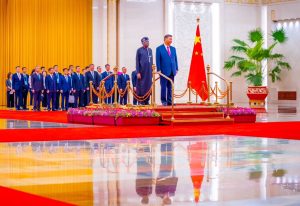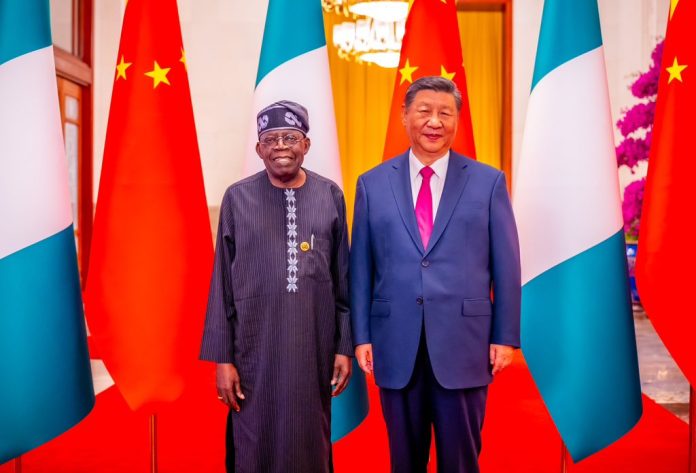In a move to bolster Nigeria’s global partnerships, President Bola Ahmed Tinubu has embarked on a diplomatic mission to China, where he held high-level talks with President Xi Jinping aimed at elevating bilateral relations to a new height. The meeting, held in Beijing, underscored a mutual commitment to fostering a comprehensive developmental partnership between the two nations, with a focus on economic cooperation, regional stability, and sustainable growth.
President Tinubu, addressing Nigerians through his official account on X (formerly Twitter), described the meeting as a “significant milestone” in the evolution of Nigeria-China relations. He emphasised the importance of this engagement, stating, “Today’s meeting with President Xi Jinping in Beijing marks a crucial step for our two nations.” The discussions centred on strategic cooperation in areas such as infrastructure development, trade, energy, and security.
One of the key outcomes of the meeting was the signing of five Memoranda of Understanding (MOUs), signalling a broad-based approach to collaboration. Among these agreements, the Belt and Road Initiative (BRI) takes centre stage, with Nigeria poised to benefit from China’s ambitious global infrastructure development strategy. The BRI, which aims to connect Asia with Africa and Europe through land and maritime networks, offers Nigeria significant opportunities in terms of trade expansion, infrastructure development, and foreign investment.
Another notable MOU involves the peaceful application of nuclear energy, which highlights both countries’ commitment to sustainable energy solutions. This agreement is expected to pave the way for Nigeria to explore nuclear energy as a reliable and environmentally friendly power source, contributing to the nation’s energy security and addressing its electricity challenges. Other agreements focus on enhancing bilateral trade, financial cooperation, and capacity-building initiatives that align with Nigeria’s development goals.
Furthermore, President Tinubu and President Xi agreed to establish a high-level community to foster development, stability, and security across the West African sub-region. This initiative aims to promote peace and stability in the region, particularly given the rising security challenges in West Africa, including terrorism, piracy, and transnational crime. By collaborating on these fronts, both nations are expected to strengthen their influence and impact on regional stability.
The meeting also highlighted Nigeria’s strategic importance in China’s foreign policy, especially as a key partner in Africa. President Xi Jinping reaffirmed China’s readiness to support Nigeria’s development agenda and its aspirations for sustainable growth. He reiterated China’s commitment to deepening ties with Nigeria through increased investment in critical sectors such as agriculture, technology, and infrastructure.
For Nigeria, this diplomatic engagement represents an opportunity to leverage China’s experience in economic development, technological innovation, and poverty reduction. It also provides a platform for Nigeria to seek support for its domestic initiatives aimed at boosting economic growth, creating jobs, and improving living standards.
President Tinubu’s visit to China comes at a critical time as Nigeria seeks to diversify its foreign partnerships and enhance its global standing. It signals a proactive approach by the Tinubu administration to strengthen ties with global economic powers while addressing pressing domestic challenges. The agreements reached are expected to have far-reaching implications for Nigeria’s economic trajectory, regional influence, and overall development agenda.
As both countries move forward with their newly forged commitments, the visit sets a precedent for future engagements, showcasing a shared vision of mutual prosperity and sustainable development.
By Anthony Emeka Nwosu




